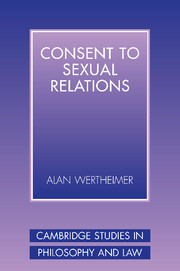Book contents
- Frontmatter
- Contents
- Preface
- Acknowledgments
- Abbreviations
- 1 Introduction
- 2 Law
- 3 The psychology of sex
- 4 The psychology of perpetrators
- 5 The harm and wrong of rape
- 6 The value of consent
- 7 The ontology of consent
- 8 Coercion
- 9 Deception
- 10 Competence
- 11 Intoxication
- 12 Sex and justice
- Appendix: Alphabetical list of hypothetical cases
- Index
1 - Introduction
Published online by Cambridge University Press: 04 March 2010
- Frontmatter
- Contents
- Preface
- Acknowledgments
- Abbreviations
- 1 Introduction
- 2 Law
- 3 The psychology of sex
- 4 The psychology of perpetrators
- 5 The harm and wrong of rape
- 6 The value of consent
- 7 The ontology of consent
- 8 Coercion
- 9 Deception
- 10 Competence
- 11 Intoxication
- 12 Sex and justice
- Appendix: Alphabetical list of hypothetical cases
- Index
Summary
It is commonly thought that we should regard it as morally and legally permissible to engage in sexual relations if and only if the parties consent to do so. With appropriate qualifications, I think this view is correct. But, as with many other principles, it raises more questions than it resolves. Among those questions are the following.
First, what is the moral significance of consent to sexual relations? A law professor is reported to have remarked that “consent turns an act of rape into an act of lovemaking.” That seems improbable. Acts of prostitution can be consensual, yet fall quite short of acts of love. If consent is not sufficient to render sexual relations a positive good, is it sufficient to render sexual relations morally permissible? Does consent render sexual relations consistent with Kant's formula of humanity, the principle that we should always treat others as ends in themselves and never merely as a means?
Second, in what ways are nonconsensual relations harmful or wrongful? And are harm and wrong identical? In posing these questions, I do not mean to imply that nonconsensual sexual relations are not (almost always) harmful or wrongful. Still, it may be less clear precisely why this is so. Consider forcible rape. Is it a simple harm to the body, similar to the harm of a nonsexual assault? Or is it a harm in virtue of its contact with the victim's sexual organs? If so, why is such contact especially harmful?
- Type
- Chapter
- Information
- Consent to Sexual Relations , pp. 1 - 10Publisher: Cambridge University PressPrint publication year: 2003

